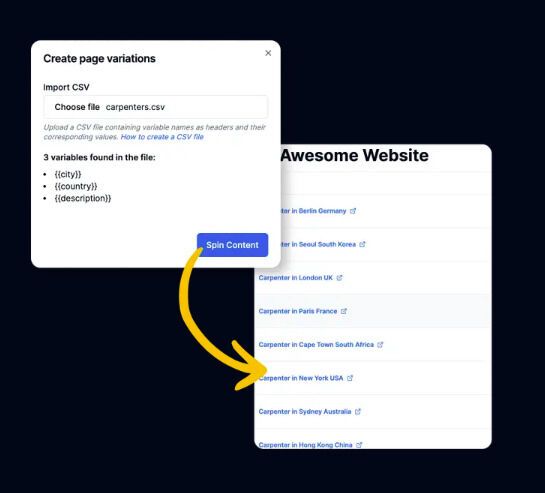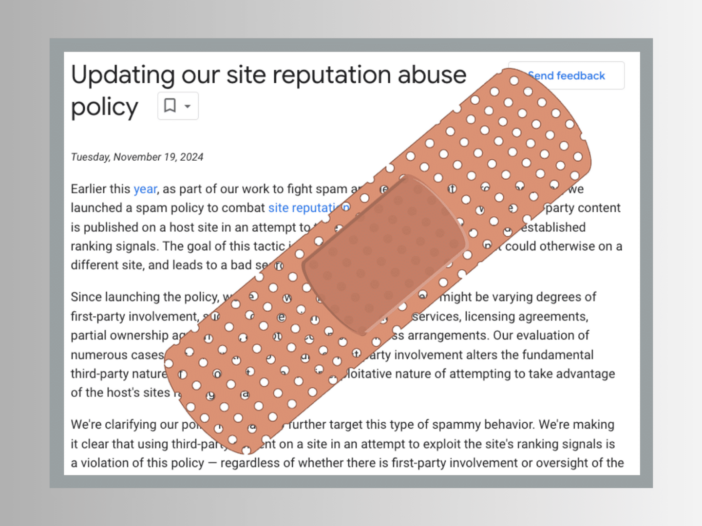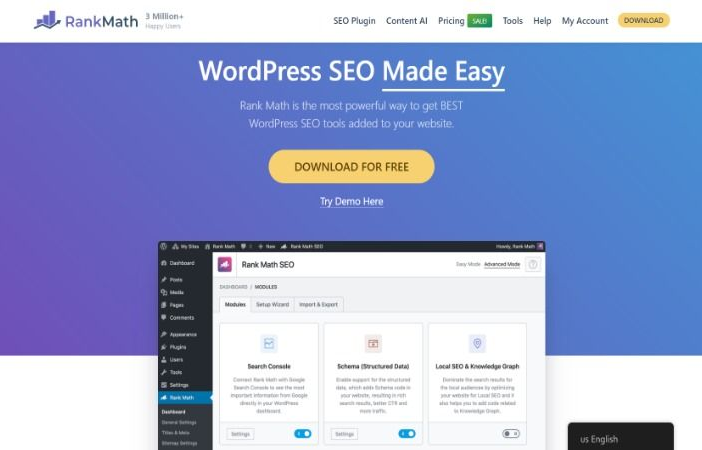Unleashing SEO Potential: Insights from Bruce Shi on Top Tools – TechBullion
In today’s digital landscape, search engine optimization (SEO) is essential, but achieving top-notch SEO strategies can be daunting without the right tools. SEO tools are the backbone of successful digital marketing efforts. They help analyze data, track performance, and refine strategies to boost online visibility. From keyword research and backlink analysis to site audits and rank tracking, the right tools can make all the difference.
SEO Specialist, Bruce Shi explores the top SEO tools that can unlock your site’s potential. Through his professional perspective, he’ll discuss how these tools can streamline your processes, provide invaluable insights, and ultimately drive more traffic to your site.
SEO is like a recipe for online success. It involves several techniques and practices that make your website more attractive to search engines. Think of search engines as giant libraries. When you type something into Google, it’s like asking the librarian for the best book on that topic. SEO ensures your website is that “best book.”
SEO is a fundamental part of digital marketing. The internet is crowded. SEO helps your website stand out in a sea of information. When your site appears on the first page of search results, you’re more likely to get noticed. High search engine rankings give your site credibility. People trust search engines, so when you rank high, it shows you’re a trusted source.
“More visibility means more clicks,” says Bruce Shi. “More clicks mean more traffic. More traffic often translates to more customers or readers. SEO isn’t only about search engines but about users.”
Good SEO practices improve the overall experience of your site, making it faster and easier to navigate. SEO is like having a billboard at a busy intersection; more people will see it. But unlike a billboard, SEO targets people already interested in what you offer. This makes it one of the most effective forms of marketing.
Navigating the waters of SEO can be tricky without the right tools. To truly harness the power of SEO, using effective tools is a must.
Keyword research is the backbone of any successful SEO strategy. Without identifying the right keywords, your content may not reach its full potential. Keywords are like the signposts that guide traffic to your website. Proper keywords help in attracting the right audience to your website. Knowing what keywords your competitors are targeting allows you to find gaps in the market.
“Maintaining your website’s SEO health is crucial for achieving long-term success. This is where site audit tools come into play,” notes Bruce Shi.
These tools scan your website to identify issues that could be hindering your SEO performance. Using these site audit tools, you can keep your website healthy and optimized, ensuring that your audience has a smooth and engaging experience on your site.
In the ever-changing world of SEO, staying ahead of the curve is crucial. The landscape of SEO tools is constantly evolving with new technologies and strategies. These innovations will help you stay competitive and ensure your content remains relevant and visible.
AI and machine learning have made significant strides in recent years. They are now vital components in many SEO tools. These technologies can analyze vast amounts of data faster than any human, providing insights that can optimize your SEO strategy. Imagine having a tool that not only tracks keyword performance but also predicts future trends. AI and machine learning make this possible by learning from past data to forecast what’s next.
As smart speakers and voice-activated devices become more popular, voice search is becoming a significant factor in SEO. SEO tools are now incorporating features that help you optimize for voice queries. Traditionally, people typed short phrases into search engines. But with voice search, users tend to ask full questions. SEO tools of the future will focus on understanding natural language and speech patterns to ensure your content aligns with these longer, conversational queries.
Gone are the days when you’d wait weeks or even days for SEO reports. Future SEO tools will provide real-time data analysis, offering instant insights into how your strategies are performing. This allows for quicker adjustments and more agile approaches to SEO. Imagine tweaking your content in real-time based on user behavior and search engine algorithms. Real-time data means you can adapt faster and stay ahead of your competition.
Keyword clustering is grouping related keywords together to cover a topic comprehensively. Future SEO tools will offer enhanced keyword clustering capabilities. Instead of focusing on single keywords, these tools will help you create clusters of related terms. This holistic approach ensures that your content is well-rounded and covers all relevant aspects of a topic, boosting your chances of ranking higher in search results.
Understanding user intent is becoming increasingly important. SEO tools are getting better at analyzing user intent, helping you create content that meets the specific needs of your audience. Future tools will provide deeper insights into user behavior and preferences, allowing you to tailor your content more precisely. This means not just knowing what people are searching for, but why they are searching for it.
With more people using mobile devices to access the internet, search engines like Google are prioritizing mobile-friendly websites. Future SEO tools will emphasize mobile-first indexing, ensuring your website is optimized for mobile users. These tools will highlight areas where your site may be lacking in mobile optimization, helping you make necessary adjustments to improve user experience and search rankings.
By staying informed about these future trends, you can ensure your SEO efforts remain effective and competitive. Embracing these innovations will help you unlock your SEO potential and achieve better results in the ever-evolving digital landscape. Staying updated with SEO tools and strategies ensures you stay ahead in the digital race.
Continuous learning and adaptation are key in the ever-changing landscape of search engine optimization. As the digital world evolves, so do the tools and techniques needed to master it. Embrace the future of SEO with confidence. Stay curious, experiment with new tools, and keep refining your strategies. The commitment to ongoing education and adaptation will keep your SEO tactics sharp and effective.
Ethereum (ETH) has frustrated investors due to its disappointing price action. However, as Bitcoin…
The Tron network has witnessed incredible growth in several areas, especially in its adoption,…
Starting a business is a thrilling venture, but securing reliable payment solutions can be…
Minecraft 1.21 is a highly popular sandbox video game that allows players to explore,…
Car shipping services are becoming increasingly popular, and for good reason. With the rise…
Creating an online store that not only attracts visitors but also converts them into…
After researching and testing more than a dozen wireless earbuds and headphone brands, we…
The Jenny Mod for Minecraft is a third-party mod designed for the Java Edition,…
Both Dogecoin (DOGE) and Shiba Inu (SHIB) are on the rise, with market expectations…
Your smile is one of the first things people notice about you, and having…
Creating experiences that are not only functional but also inclusive has become a non-negotiable priority for designers and developers alike in today’s…
In this exclusive TechBullion interview, Taha Ahmed, Chief Growth Officer and Head of Web3 at Forbes, sheds light on the iconic media…
Prepare for a seismic shift in the automotive industry; Oilstainlab is poised to redefine the industry’s boundaries. With an uncompromising vision and…
The electric vehicle (EV) commercial market is expected to be a 255.6 Billion dollar market by 2030. One of the most innovative…
TechBullion
FinTech News and Information
Copyright © 2024 TechBullion. All Rights Reserved.
How to Get an SE Ranking Free Trial for 14 Days – Gizmodo
Do blockchain start-ups need SEO? – BusinessCloud
Posted on November 22, 2024 by staff
For blockchain start-ups conquering in a digital battlefield, search engine optimization (SEO) might seem secondary to the tech and innovation driving their platforms. After all, you’ve likely spent hours on code, security, and unique blockchain features. But here’s the catch: without solid SEO, potential clients and investors might never discover your start-up, no matter how innovative it is.
To be honest, digital marketing is crowded. If your start-up doesn’t show up on the first few pages of Google or other search engines, potential customers are far less likely to find you. SEO helps you climb these rankings by optimising your content and website structure.
For blockchain startups, having high search visibility means reaching people who are interested in blockchain applications but may not know your company exists. SEO can act as a magnet, pulling potential clients, collaborators, and investors toward your start-up.
In order to formulate a solid SEO strategy, you should enlist the services of an SEO agency, like Golden Metrics. Considered to be the top crypto agency for SEO, Golden Metrics specialises in blockchain services and everything connected to it. They can bridge the gap between your blockchain start-up and the broader digital audience. People who want to know about blockchain’s potential in finance, healthcare, gaming, or other industries will likely turn to search engines with queries related to blockchain solutions.
Blockchain is still a relatively new concept for many people, and scepticism remains high because of concerns about security, regulations, and reliability. Here’s where SEO-backed content can really help. Consistent, high-quality content optimised for relevant keywords can make your start-up a reliable source of information and insights in your niche. When users find informative, well-written content on your site, it helps build trust.
When people repeatedly see your site providing valuable and accurate information on blockchain issues, they’ll begin to see your company as a thought leader. This approach works wonders for investor interest and customer confidence.
Many potential customers or partners are still learning about blockchain technology, and they often Google to find answers. SEO can help you reach these people right as they’re seeking education. For example, you can create content around keywords like ‘how does blockchain work,’ ‘blockchain in healthcare,’ or ‘what is DeFi’ to reach readers who are in the early stages of learning about blockchain.
Through SEO, your start-up has the opportunity to simplify blockchain concepts, educate visitors, and create trust. People prefer to work with companies that offer clarity on complex topics–if they learned about blockchain through your start-up’s content, they’ll remember you as a trustworthy source. Plus, as they grow more comfortable with the technology, they’re more likely to take the next step in interacting with your products or services.
New players are entering the market daily. From decentralised finance (DeFi) platforms to non-fungible token (NFT) marketplaces, competition is fierce. SEO can be a way to stand out amidst this crowd. The blockchain industry’s high competition means your start-up needs a strategy to rise above others, especially established competitors with bigger budgets.
You can focus on niche keywords that relate to your unique offerings, so you can attract audiences interested in exactly what your start-up has to offer. For instance, long-tail keywords, like ‘secure blockchain solutions for small businesses’ or ‘NFT platform for digital artists,’ are often less competitive and more likely to attract high-intent users–people already considering a service or solution in your specific area.
Blockchain startups, like many early-stage companies, may not have unlimited funds for marketing. Traditional advertising can be expensive, and it often doesn’t provide lasting benefits. With SEO, however, the return on investment (ROI) can be substantial. Unlike ads that disappear once you stop paying, SEO efforts (like optimised content and keyword targeting) continue to attract traffic long after you’ve published them.
Investing in SEO now can create a solid foundation for organic growth over time. You can build a digital presence with strong SEO to achieve consistent traffic and brand awareness without spending large sums on paid campaigns. SEO can deliver a compounding effect, meaning the longer you work on it, the better the results tend to get.
SEO enables you to reach exactly the kind of people who are most interested in your start-up. In blockchain, your target audience could range from developers and tech enthusiasts to investors and everyday consumers. Each of these groups is looking for information in a different manner. For example, developers might search for technical guides on implementing blockchain, while investors may look up ‘latest blockchain startups’ or ‘top blockchain investment opportunities.’
Using blockchain-specific keywords that match your audience’s search intent can draw more relevant visitors to your site. Conducting keyword research in the blockchain field helps you identify terms your ideal audience is using, so you can create content that directly addresses their needs and questions.
Mike Allen
managing director, Cambria Private Capital
Kimberley Waldron
founder & MD, Started PR
Jonathan Symcox
editor, BusinessCloud
Jonathan Boyers
Head of Corporate Finance for EMEA, Alvarez & Marsal
Mike Allen
managing director, Cambria Private Capital
Kimberley Waldron
founder & MD, Started PR
Jonathan Symcox
editor, BusinessCloud
Jonathan Boyers
Head of Corporate Finance for EMEA, Alvarez & Marsal
Office 63, 19 Lever Street, Manchester M1 1AN
© BusinessCloud Publishing Limited
Google’s site reputation abuse policy is a band-aid for a bullet wound – Search Engine Land
sel logo
Search Engine Land » SEO »
Chat with SearchBot
SearchBot:
Google’s updated site reputation abuse policy attempts to tackle a growing issue in search: large, authoritative sites exploiting their domain strength to rank for content they don’t own or create.
While the policy is a step in the right direction, it doesn’t address the underlying systemic problems with Google’s algorithm that allow this abuse to thrive.
Google’s site reputation abuse policy was introduced in March 2024, but its announcement was overshadowed by a major core update that same month.
As a result, what should have been a pivotal moment for addressing search manipulation was relegated to a footnote.
At its core, the policy targets large, authoritative websites that leverage their domain strength to rank for content they didn’t create.
It’s designed to prevent these entities from acting as “hosts” for third-party content simply to exploit search rankings.
A clear example would be a high-authority business site hosting a “coupons” section populated entirely with third-party data.
Recently, Google expanded the policy’s scope to address even more scenarios.
In the updated guidelines, Google highlights its review of cases involving “varying degrees of first-party involvement,” citing examples such as:
This makes it clear that Google isn’t just targeting programmatic third-party content abuse.
The policy now aims to curb extensive partnerships between authoritative sites and third-party content creators.
Some of these often involve deeply integrated collaboration, where external entities produce content explicitly to leverage the hosting site’s domain strength for higher rankings.
Dig deeper: Hosting third-party content: What Google says vs. the reality
These partnerships have become a significant challenge for Google to manage.
One of the most impactful SEO investigations this year was Lars Lofgren’s article, “Forbes Marketplace: The Parasite SEO Company Trying to Devour Its Host.”
The piece dives into Forbes Advisor’s parasite SEO program, developed in collaboration with Marketplace.co, and details the substantial traffic and revenue generated by the partnership.
Forbes Advisor alone was estimated to be making approximately $236 million annually from this strategy, according to Lofgren.
As Lofgren puts it:
This highlights the systemic problem with Google search.
Forbes Advisor is just one of the examples of parasite SEO programs that Lofgren investigates. If you want to go deeper, read his articles on other sites running similar programs.
LinkedIn is another prime example. Over the past few years, users have increasingly leveraged LinkedIn’s UGC platform to capitalize on its powerful domain authority, pushing their content to the top of search results.
For instance, as of this writing, the top-ranking result for “healthcare SEO” is not from a specialized expert site but a LinkedIn Pulse article.
If you dig in their query data, you’ll see a range of queries from business, adult topics, personal loans and more.
Clearly, LinkedIn isn’t the best source for all of these things, right?
The rise of programs designed to manipulate search results has likely pushed Google to introduce the site reputation abuse policy.
Get the newsletter search marketers rely on.
See terms.
This brings me to why the policy isn’t enough. The core issue is that these sites should never rank in the first place.
Google’s algorithm simply isn’t strong enough to prevent this abuse consistently.
Instead, the policy acts as a fallback – something Google can use to address egregious cases after they’ve already caused damage.
This reactive approach turns into a never-ending game of whack-a-mole that’s nearly impossible to win.
Worse yet, Google can’t possibly catch every instance of this happening, especially on a smaller scale.
Time and again, I’ve seen large sites rank for topics outside their core business – simply because they’re, well, large sites.
Here’s an example to illustrate my point. Progressive has a blog called Lifelines, which primarily covers topics related to its core business – insurance, driving tips, traffic laws, etc.
However, one of their blog posts ranks in Position 4 for the search query “puppy after vaccination side effects,” above actual experts like the American Veterinary Medical Association.
The result in Position 1? It’s Rover.com, a technology company that helps pet owners find sitters – still not a medical expert, yet leveraging its strong domain.
I’m not suggesting that Progressive is engaging in anything nefarious here. This is likely just a one-time, off-topic post.
However, the larger issue is that Progressive could easily turn its Lifelines blog into a parasite SEO program if it wanted to.
With minimal effort, it’s ranking for a medical query – an area where E-E-A-T is meant to make competition tougher.
The only way to stop this right now is for Google to spot it and enforce the site reputation abuse policy, but that could take years.
At best, the policy serves as a short-term fix and a warning to other sites attempting abuse.
However, it can’t address the broader problem of large, authoritative sites consistently outperforming true experts.
The site reputation abuse policy is a temporary band-aid for a much larger systemic issue plaguing Google.
Algorithmically, Google should be better equipped to rank true experts in a given field and filter out sites that aren’t topical authorities.
One of the biggest theories is the increased weight Google places on brand authority.
The winners of the helpful content update were more likely to have stronger “brand authority” than “domain authority,” according to a recent Moz study.
Essentially, the more brand searches a site receives, the more likely it is to emerge as a winner in recent updates.
This makes sense, as Google aims to rank major brands (e.g., “Nike” for “sneakers”) for their respective queries.
However, big brands like Forbes, CNN, Wall Street Journal and Progressive also receive a lot of brand search.
If Google places too much weight on this signal, it creates opportunities for large sites to either intentionally exploit or unintentionally benefit from the power of their domain or brand search.
This system doesn’t reward true expertise in a specific area.
Right now, the site reputation abuse policy is the only tool Google has to address these issues when their algorithm fails.
While there’s no easy fix, it seems logical to focus more on the topical authority aspect of their algorithm moving forward.
When we look at the Google Search API leaks, we can see that Google could use different variables to determine a site’s topical expertise.
For instance, the “siteEmbedding” variable implies they can categorize your whole site.
One that stands out to me is the “siteFocusScore” variable.
It’s a “number denoting how much a site is focused on one topic,” according to the leaks.
If sites begin to dilute their focus too much, could this be a trigger indicating something larger is at play?
I don’t think the site reputation abuse policy is a bad thing.
At the very least, it serves as a much-needed warning to the web, with the threat of significant consequences potentially deterring the most egregious abuses.
However, in the short term, it feels like Google is admitting that there’s no programmatic solution to the problem.
Since the issue can’t be detected algorithmically, it needs a way to threaten action when necessary.
That said, I’m optimistic that Google will figure this out in the long run and that search quality will improve in the years to come.
Contributing authors are invited to create content for Search Engine Land and are chosen for their expertise and contribution to the search community. Our contributors work under the oversight of the editorial staff and contributions are checked for quality and relevance to our readers. The opinions they express are their own.
Related stories
New on Search Engine Land
About the author
Related topics
Get the newsletter search marketers rely on.
See terms.
Learn actionable search marketing tactics that can help you drive more traffic, leads, and revenue.
Available on-demand: SMX Next
Available on-demand: SMX Advanced
Available on-demand: SMX Master Classes
Discover time-saving technologies and actionable tactics that can help you overcome crucial marketing challenges.
April 15-17, 2020: San Jose
How Content is Critical to a Winning Ecommerce Strategy
How Search Marketing Turned the Tide for CTV Audience Targeting
Driving Brand Growth: Using DAM and AI to Keep Up With Content Demands
Enterprise SEO Platforms: A Marketer’s Guide
Email Marketing Platforms: A Marketer’s Guide
Customer Data Platforms: A Marketer’s Guide
The Modern Marketing Data Stack for 2025
Meet your new AI-powered marketing assistant!
Get the newsletter search marketers rely on.
Topics
Our events
About
Follow us
© 2024 Search Engine Land is a Trademark of Semrush Inc.
Third Door Media, Inc. is a publisher and marketing solutions provider incorporated in Delaware, USA, with an address 88 Schoolhouse Road, P.O. Box 3103, Edgartown, MA 02539. Third Door Media operates business-to-business media properties and produces events, including SMX. It is the publisher of Search Engine Land, the leading digital publication covering the latest search engine optimization (SEO) and pay-per-click (PPC) marketing news, trends and advice.





